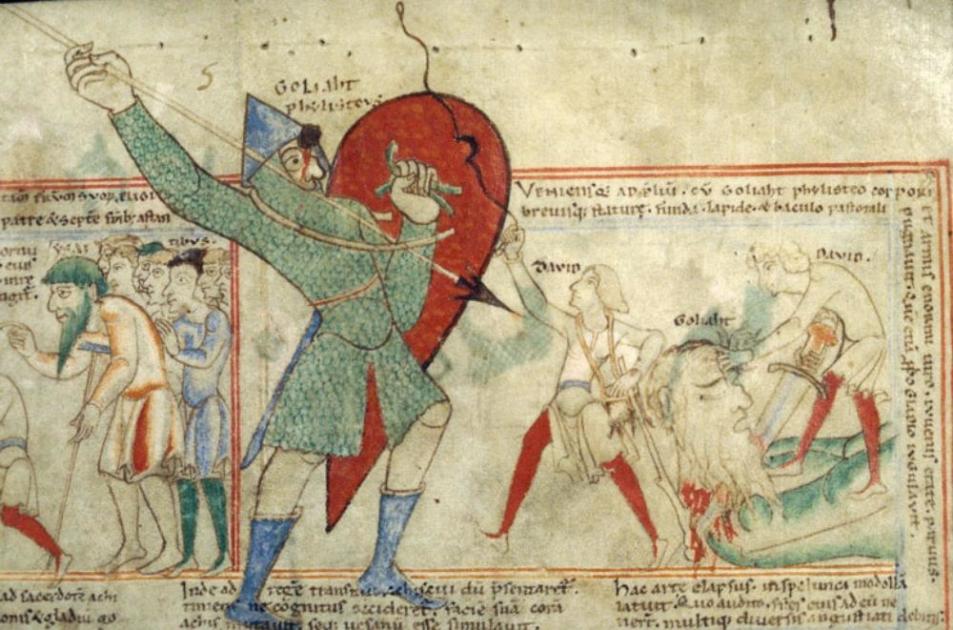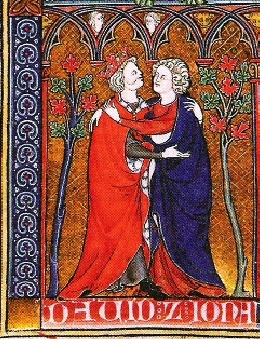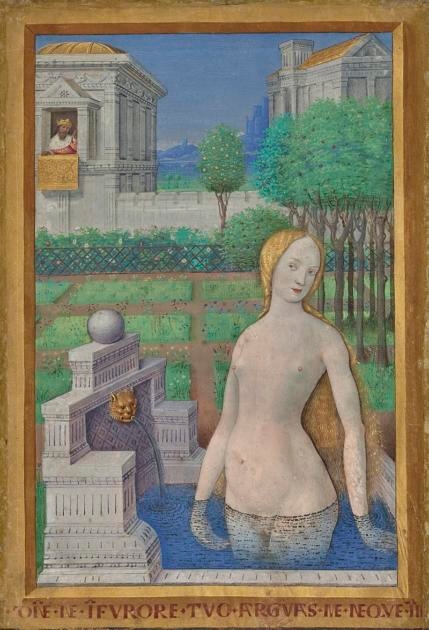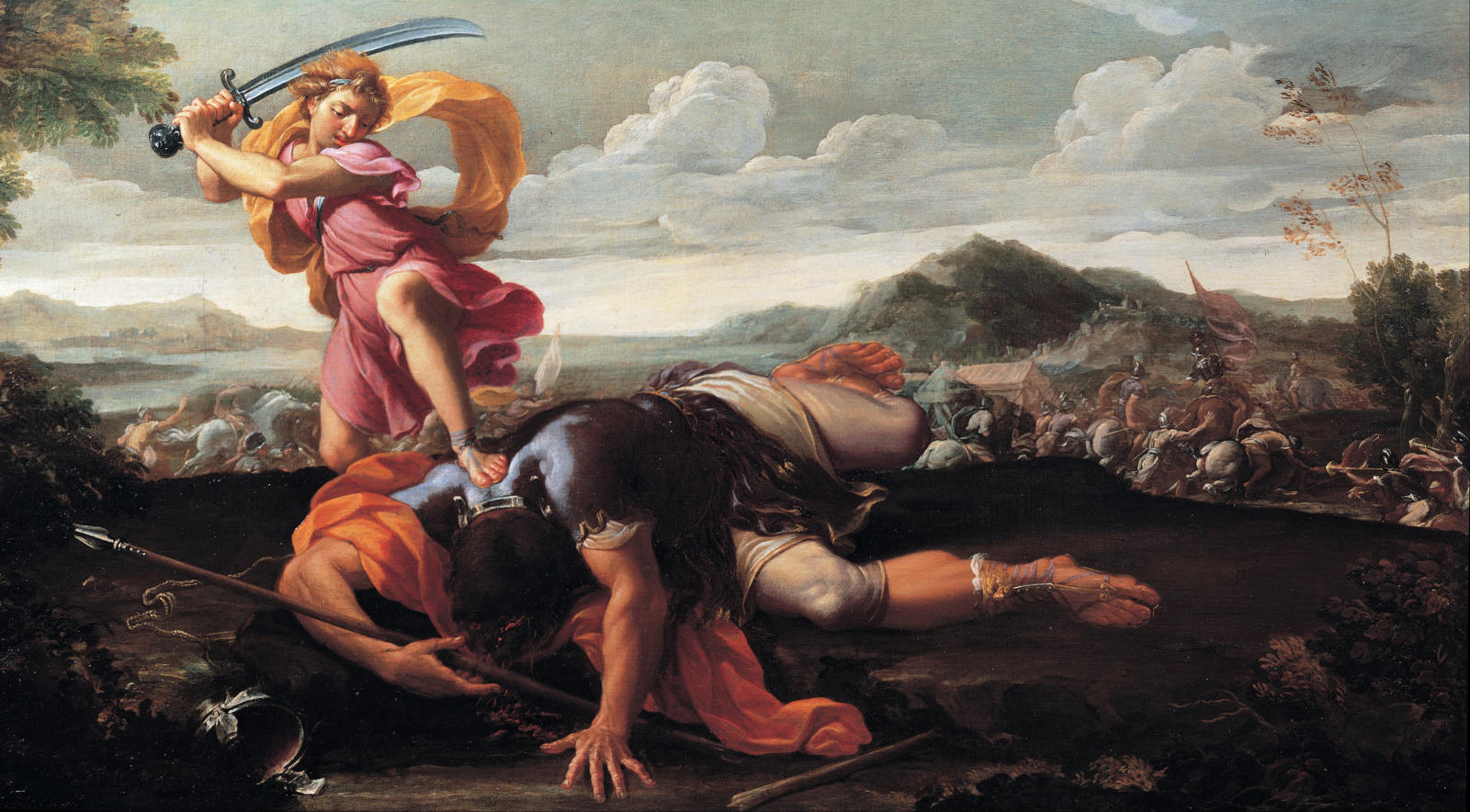- David might not have killed Goliath. David is perhaps best known for fighting and killing the giant and Philistine champion Goliath with a slingshot — a suitably awesome feat for the future king of Israel — but the Bible betrays some doubt about who deserves the credit. The Second Book of Samuel states that it was a man named Elhanan, rather than David, who bested the Philistine giant.
- He was both hero and anti-hero. David, as depicted in the Hebrew Bible is, above all, a man of profound contradictions. He is described as “a man after God’s own heart” by one biblical author, and “a bloodstained fiend of hell” by another. The word “Satan” is used in the Hebrew Bible to describe David as an adversary. He is depicted as feigning madness in a cowardly attempt to avoid the wrath of the king of the Philistines. And he carried off the wife of a man named Nabal after shaking him down for flocks and herds under threat of violence. “God do the same to me and more,” vowed David as he and his army approached the estate of Nabal, according to the earthy translation of the King James Version, “if I leave alive until morning a single one who pisses against the wall!”

David slaying Goliath. - David was a stud. “David” means “beloved” — of both God and humankind, especially women. It was the latter who used to chant (much to the consternation of David’s predecessor King Saul): “Saul has slain his thousands, and David his ten thousands!”
- David might have been bisexual. David has always been a focus of speculation when it comes to the love that “passes the love of women.” This is how the Bible characterizes the love between David and Jonathan, the son of the first king of Israel, Saul. The rest of the biblical narrative depicts David as an insatiable collector of women, including other men’s wives, but some modern readers prefer to take the ancient text at face value: “We have every reason to believe that a homosexual relationship existed,” argues Tom Horner, Bible scholar and Episcopal priest, with rare bluntness. “Seminary professors must consider it, as well as must the diagnostician of ancient male love.”

David and Jonathan. - David’s story was so scandalous it had to be censored. David’s life story appears twice in the Bible. The Book of Samuel is the first and unexpurgated version, chock full of sexual and physical violence, passion, scandal, dysfunction, and outrageous moral excess. The Book of Chronicles, composed and added to the Bible at a later date, preserves a willfully censored version that depicts David as a much milder, tamer and more pious figure. Most of the salacious, bloodthirsty and otherwise shocking incidents that we find in Samuel are left out entirely. “See what Chronicles has made of David!” declared the 19th century Bible scholar Julius Wellhausen.
- His life story might have been written by a woman. Richard Elliott Friedman, the distinguished Bible scholar and author of Who Wrote the Bible? first proposed that the biblical life story was composed by a female author shortly after David’s death. Later, and without crediting Friedman, Harold Bloom famously elaborated, referring to the author as “J” (who also authored part of the Torah): “My J is a Gevurah (‘great lady’) of post-Solomonic court circles, herself of Davidic blood, who began writing her great work in the later years of Solomon…”
- David was the youngest of eight. The Bible has been characterized as a saga that celebrates the failure of the first-born sons and the success of later-born sons: Isaac over Ishmael, Jacob over Esau, Moses over Aaron (and Miriam), etc. More extreme than these pairs: David was the youngest of seven or eight sons.
- David is mentioned more than 1,000 times in the Bible. David’s name appears a lot — so much that according to at least one Bible scholar, the religion of ancient Israel ought to be called “Davidism” because of the king’s essential role in the history and theology of Judaism.
- “Speak truth to power” originates with David. It started with David’s adulterous affair with Bathsheba, a beautiful woman married to a soldier named Uriah. After spying Bathsheba bathing, David seduced her and she became pregnant. To cover the affair, the king called Uriah home to sleep with his wife (so he would think the child was his), but Uriah loyally chose to stay with his troops. So David sent Uriah to the front to be killed and married Bathsheba. The prophet Nathan memorably confronts King David with treachery: “Uriah the Hittite [Bathsheba’s husband] thou has smitten with the sword, and his wife thou has taken to be thy wife. Now, therefore, the sword shall never depart from thy house.”

David spying on Bathsheba. - You thought Thanksgiving was tense in your house. Nathan’s prophecy proves to be literally true. One of David’s sons rapes his half-sister, Tamar, and David’s male offspring go to war against him in an effort to claim his throne.
- David created history’s first “hit list.” In one of his final acts as King of Israel, David gives his son and heir Solomon a hit list — “a last will and testament worthy of a dying Mafia capo,” says Bible scholar and translator Robert Alter — and the biblical scene may have been the inspiration for the final scene of The Godfather.
- David is the first figure in the Hebrew Bible for whom we have archaeological evidence. Nothing confirms the existence of the patriarchs or the matriarchs, Joseph or Moses or Saul. But the discovery of an inscription on an ancient stone in 1993 seems to confirm that David was, in fact, a flesh and blood figure.
- Jewish tradition says David never died. David’s mortal death is described in the Bible. But by long tradition in both Judaism and Christianity, he will live forever, both in the bloodline of the Messiah as he is imagined in Jewish tradition and the bloodline of Jesus of Nazareth as it is given in the New Testament. That’s why the much-celebrated Jewish song “David, Melech Yisrael,” is actually a messianic celebration of David’s persistence in history. “David, Melech Yisrael, Ch’ai, Ch’ai, Vi’kai-yom” means: “David, King of Israel, is alive today.”
- He was a pop star, then and now. David, the sweet singer of Israel, is the traditional author of the Book of Psalms — a set of 150 poems in the Hebrew Bible. But he’s also the inspiration for well-known contemporary music. Leonard Cohen’s “Hallelujah” celebrates “the baffled king” and his sexual adventure with Bathsheba, mother of King Solomon. More than 300 versions of the song have been recorded. In that sense, too, King David “is alive today.”
Want to get to know more amazing, complicated, and relatable biblical personalities? Sign up for a special email series here.

Help us keep Jewish knowledge accessible to millions of people around the world.
Your donation to My Jewish Learning fuels endless journeys of Jewish discovery. With your help, My Jewish Learning can continue to provide nonstop opportunities for learning, connection and growth.



